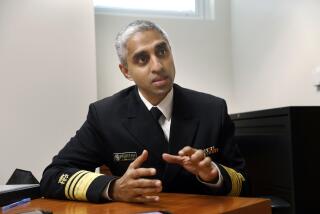Linking Teen Troubles to Solutions : Youth Advisory Council in Ohio Stresses Student Input
- Share via
MENTOR, Ohio — Teen-agers with problems in Lake County schools often find that help is just a seat away in their classrooms.
A program in its third year among schools in the county offers help to troubled students through the Youth Advisory Council, formed with a dozen students from area schools and operating under auspices of the county’s Youth Service Coordinating Council.
It exists to listen, to learn, to wrestle with and, participants hope, to find answers to problems faced by students. While they frown on questions about the fairness of an exam, the students offer willing assistance to fellow students concerned with such real-life problems as social normality and acceptance, sexuality, substance abuse and relationships with friends, parents or other relatives.
Every other Monday night, the select group gathers at Mentor High School library to review problems that have filtered to them directly or indirectly from other students, to discuss the status of pending problems and to look at possible sources for resolving expected problems.
Some problems are picked up in classroom and hallway conversation. Some come from teachers or anonymous letters. For at least 90 minutes at each meeting, the students brainstorm problems and solutions, trying to match the former with the latter.
Peers Can Help
The council may suggest a public health agency, a mental health organization, a school official or a court officer where their peers can get help.
Fran Grum, planning director of the Youth Service Coordinating Council; Dan Litzinger, a guidance counselor at Mentor High, and Linda McKay of the Lake County PTA sit as advisers to the advisory council.
Students are chosen for the group by guidance counselors in Lake County high schools. All council members are honor students, and many are involved in athletics or other extracurricular activities. Schools in all nine school districts in the county are involved.
Now a Wife, Mother
Grum, 40, a former psychiatric nurse and now a wife and mother of two children, is director of the coordinating council, which has a budget of less than $40,000 to help plan and coordinate services of several local groups. The service group is funded mainly by a state agency and a local mental health board.
The advisory council, she said, “is aimed at kids from age zero to 18 years. It varies, depending on problems and priorities. One of the largest priorities has been in the area of substance abuse.
“When we first set it up, we felt strongly that we shouldn’t plan on behalf of teen-agers without getting their input,” she continued. “We felt we should hear what happens in the schools and what problems they have.
“These (council) kids want to make sure that other kids know where to get help with real problems, like suicide, drugs, mental health.”
Longtime Participants
She said some present advisory council members had been a part of the organization almost from its inception nearly three years ago.
“They enjoy being a part of the group,” she said. “They want to give something back to the other kids.”
Participation in the council is open to students from all schools in the area--county, urban, rural, public, private or parochial.
“I was amazed to learn from some of the teen-agers about their very real concerns about nuclear power,” Grum said. “They have talked about this at some length.
How to Say No
“And some of the problems are things which occurred to me when I was a teen-ager--morality, dating, how to say no, how to get the trust of parents, getting parents to trust you to drive the family car safely.
“I think it is really important that we don’t forget how teen-agers feel and what they are going through, that we hear from them about their problems.”
More to Read
Sign up for Essential California
The most important California stories and recommendations in your inbox every morning.
You may occasionally receive promotional content from the Los Angeles Times.













